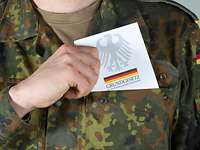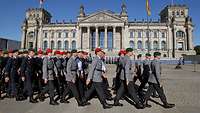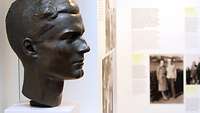Leadership Development and Civic Education
Leadership development and civic education are the “corporate philosophy” of the Bundeswehr. At the same time, the concept is very multifaceted.



Leadership development and civic education are the “corporate philosophy” of the Bundeswehr. At the same time, the concept is very multifaceted.

The principles of leadership development and civic education lay the foundation for military service in the Bundeswehr. Leadership development and civic education give military personnel the moral basis they need to meet the special requirements of their careers. Leadership development and civic education are the Bundeswehr’s value system.
They also position military personnel within our mainstream society. The rights guaranteed in the Basic Law for the Federal Republic of Germany also apply to them. However, as citizens in uniform, they have a special obligation to uphold the values and standards of the Basic Law.

The primacy of politics: the German Bundestag makes the decisions on the Bundeswehr’s operations.
Bundeswehr/Sebastian WilkeIn keeping with the principles of leadership development and civic education, Bundeswehr soldiers are called to think for themselves and not blindly obey. The Bundeswehr’s military personnel must refuse to carry out unlawful commands. By the same token, their superiors are obligated to only issue lawful commands.
The heart of leadership development and civic education with their guiding principle of responsible citizens in uniform is immutable. However, it is continually developed further in light of the rapidly changing world. One example of this further development is the current directive on traditions, “Guidelines on Tradition and the Cultivation of Tradition in the Bundeswehr”, from 2018.

What is worthy of becoming a tradition? Workshops are held to discuss this topic.
Bundeswehr/Oliver LangIn keeping with leadership development and civic education, the Bundeswehr is subject to what is known as the “primacy of politics”. The Bundeswehr is firmly anchored in our democracy. And it is a parliamentary army: the German Bundestag exercises vital control over our armed forces. For example, armed operations must be decided on and mandated by the Bundestag.
In the context of leadership development and civic education, the office of the Parliamentary Commissioner for the Armed Forces is of particular importance. The Parliamentary Commissioner for the Armed Forces plays an important role in upholding the principles of leadership development and civic education in the Bundeswehr. Everyone in the forces can provide input directly to the Parliamentary Commissioner. The Parliamentary Commissioner ensures that the human dignity and basic rights of military personnel are respected both during military routines and on operations.
The Advisory Council on Leadership Development and Civic Education is also an important element in the context of leadership development and civic education. The Advisory Council is an independent personal advisory body that advises the Federal Minister of Defence in matters of leadership development and civic education through expert opinions and recommendations.

An aspiration and a commitment: the Bundeswehr follows in the tradition of the military resistance in which Colonel von Stauffenberg participated.
Bundeswehr/Carsten VennemannOnly by reflecting on its history can we understand the fundamental idea of leadership development and civic education. Founded just ten years after the end of World War II, the Bundeswehr had to be a totally different military to all of its predecessors. The Reichswehr in the Weimar Republic, for example, posited the ideal of the apolitical soldier. And the Wehrmacht was involved in the crimes of the Nazi regime. For this reason, it has no place in the Bundeswehr’s traditions. In contrast, the German resistance to the Nazi1 regime – which Wehrmacht soldiers such as Colonel Claus Schenk, Count von Stauffenberg, also joined – is formative of Bundeswehr traditions.